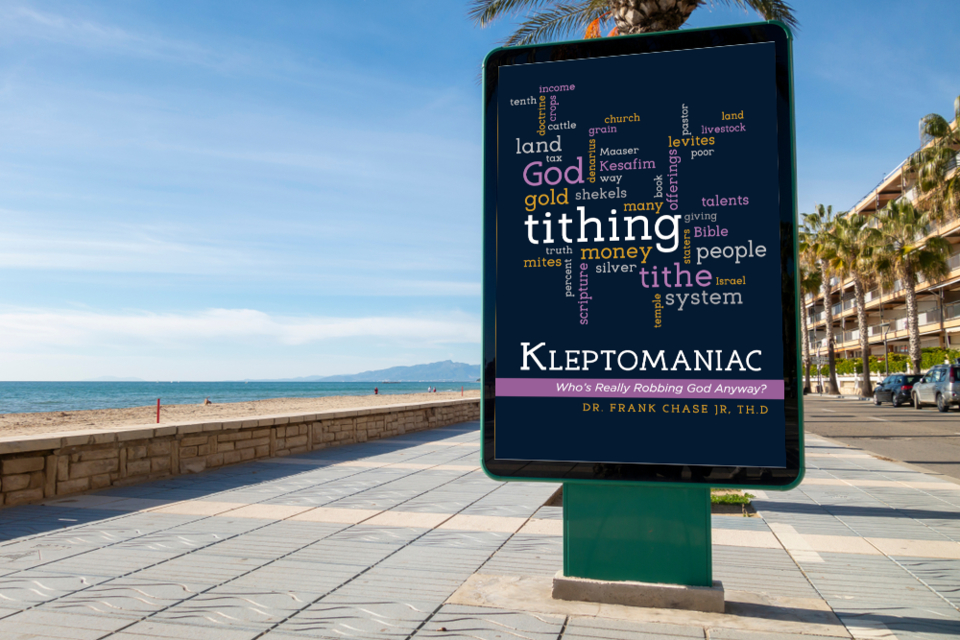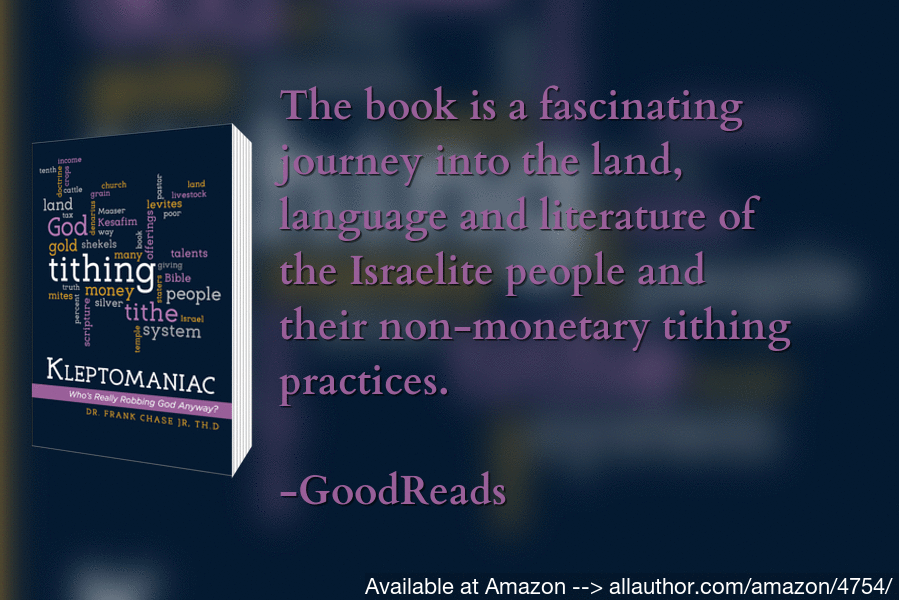This book started out as a 117-page power point study. The research for this book became a historical and biblical analysis of modern so-called monetary tithe verses the authentic and approved biblical agricultural and livestock tithe. Journey through the power point presentation and then read more exhaustive 400 page book analysis of tithing system and how it got commuted to cold hard cash. The truth is shocking and will inform you of the truth that was hidden in plain sight.
Kleptomaniac – Who’s Really Robbing God Anyway?
Follow the social media campaign for Kleptomaniac: Who’s Really Robbing God Anyway? on All Author
Author and former military man Frank Chase Jr. grew up in Baltimore, MD. He got interested in writing from watching movies and listening to a radio show called mystery theatre, but it was only in his thirties after a divorce that his desire to write escalated. His debut book “False Roads to Manhood: What Women Need to Know: What Men Need to Understand” took him seven years of research and writing. If he weren’t a writer, Frank would be a stage actor as it has been his passion since high school.Being a writer has taught him that everyone will not agree with you or what you may write, but it leaves a record and a legacy that can help future generations long after you have passed on. He is currently writing a scripture-centered book and also plans on writing a fiction novel soon. Read full interview…


|
||||
|
||||
| Thank you for your support, Frank Chase Jr |
||||
Were Offerings in the Old Testament Money?
Malachi 3:8 is the bread and butter of tithe proponents. It is the main scripture used to enforce a mandatory monetary tithe in the church today. Many believers never question the doctrine because of fear of a curse from God. The conspiracy to change the biblical tithe from an agricultural base to a monetary base began before many of us were born. The scriptures read in Malachi 3:8-11:
Will a man rob God? Yet you have robbed Me! But you say, ‘In what way have we robbed You?’ In tithes and offerings. 9 You are cursed with a curse, For you have robbed Me, Even this whole nation. 10 Bring all the tithes into the storehouse, That there may be food in My house, And try Me now in this,” Says the LORD of hosts, “If I will not open for you the windows of heaven And pour out for you such blessing That there will not be room enough to receive it. 11 “And I will rebuke the devourer for your sakes, So that he will not destroy the fruit of your ground, Nor shall the vine fail to bear fruit for you in the field,” Says the LORD of hosts;
The key to interpreting these verses is to ascertain the main subject, which is food not money. God said to them to bring the tithe into the storehouse (barn) so there would be food (to eat) in his house for the Levites when they were on duty in the temple. The verse starts out by saying that the priest robbed God in Tithes and Offering. And yet people want so bad to make these verses refer to money when the context is clear that God interest was in agricultural products and herds and flocks. We know that tithes in this verse is based on the Hebrew word Ma’aser, which means everything edible. So what was God implying when he said to the people in Malachi that they were also robbing him in offerings also? Were offerings money? Here’s how the pulpit preacher butchers this verse. They say that a believer can’t or God won’t accept an offering from them until they first pay their tithe. But in Malachi it say tithes, which is plural and tithes is mentioned first. So that means tithes come from many products, and money is not one of them. In previous blogs, I wrote about three different tithes in Israel and I also covered the various tithes in my book, Kleptomaniac: Who’s Really Robbing God Anyway?. So looking at this verse which references tithes and offerings it is clear many people in today’s churches are not paying tithes and offerings like Malachi 3:8-10 dictates.
So what does the offerings consist of in Malachi 3:8-10 and what kind were they? In this blog, I will give you a short list of scriptures on offerings for you to read so that you can determine for yourself whether offering are simply money you give on every Sunday morning tithe stickup. The offerings we are going to look at come from Exodus, Leviticus and Numbers. I will not list everyone in the Bible, but you will know from this list what offerings consisted of and its purpose.

- Exodus 13:12 first Offspring of every womb: that you shall set apart to the LORD all that open the womb, that is, every firstborn that comes from an animal which you have; the males shall be the LORD’s (NKJV). In this verse, we see that first-born male animals were dedicated to the Lord. In follow on verses donkeys was not accepted but had to be redeemed with a lamb. So that means the herder gave the donkey and bought it back with a lamb. Also God wanted every firstborn male child, but they were also bought back the parents and told to remember this as God killed the first-born males in Egypt. In this verse, there is no money request from Yahweh in the law of the firstborn.
- Exodus 29:14 Sin offering: But the meat, the skin and the food still in the bull’s stomach must be burned outside the camps as an offering to ask forgiveness for the sins of the priests (CEV). In this verse, which requires a sin offering is clear is that in the old covenant, payment for sins committed required the life of an animal. So the question is, if the pastor says you can’t pay an offering until you first tithe, then are you using money to pay for your sins and rejecting the finished work of the Messiah on the cross? As you can see, a sin offering did not require money. The fact is, money can only be offered only if the verse specifically calls out shekels, silver, gold, talents, denari or other forms of biblical money.
- Exodus 29:18: Burnt offering: 18 And you shall burn the whole ram on the altar. It is a burnt offering to the LORD; it is a sweet aroma, an offering made by fire to the LORD (NKJV).
Burnt offerings don’t look like money to me. To be facetious, I guess you pay your money offering in church and according to the scripture, if they are hundred-dollar bills I guess by scripture you have to set them on fire as a sweet-smelling savor to the Lord. I regress, but it doesn’t look like this verse can be used to extract a money offering from congregants on Sunday.
4. Exodus 29:40 Drink offering: With the one lamb shall be one-tenth of an ephah of flour mixed with one-fourth of a hin of pressed oil, and one-fourth of a hin of wine as a drink offering (NKJV). Here is how it reads in the CEV: With each lamb offer two pounds of your finest flour mixed with a quart of pure olive oil, and also pour out a quart of wine as an offering.
In this verse, the text is painting a picture of full-fledged dinner cooked up for the evening for God. So far the offerings that Malachi speaks of appear related to food and not money. So the question becomes, does Malachi’s offerings have anything to do with robbing God of money? So as you can see, this is food offered to God and then he told the offeror to pour out the wine on the fire for sweet aroma to God. Now this wine was not unfermented. This wine in the text is the Hebrew word yayin or yahyin. That’s right ladies and gentlemen, it was fermented wine that Yahweh wanted poured on the fire with the flour, oil and lamb so he could smell it. There goes the false teaching that fermented wine did not exist in the Bible.
5. Exodus 29:41 Grain offering: And the other lamb you shall offer at twilight; and you shall offer with it the grain offering and the drink offering, as in the morning, for a sweet aroma, an offering made by fire to the LORD (NKJV).
In this verse, the priest are offering more edible items to the Lord as offerings. There is no way offerings of money can be assumed from this verse either. Isn’t is amazing that scripture proves itself through context. Offerings in Malachi are what the context tells you not what the preacher tell you to interpret. All the offerings up to this point are related to temple worship.
6. Exodus 30:10, 16; Annual atonement; And Aaron shall make atonement upon its horns once a year with the blood of the sin offering of atonement; once a year he shall make atonement upon it throughout your generations. It is most holy to the LORD (NKJV).
In this verse once a year atonement was done for the people of Israel. In no way can this be associated with any form of modern-day offerings of money in church. This verse has been fulfilled because Christ has made the final atonement for us on the cross. There is no need for believers today to try to pay money for their sins. To do so using the tithes and offerings according to Malachi is a violation of the all the offerings laws God specifically requested.
Find more photos like this on The Book Marketing Network
In my book, Kleptomaniac: Who’s Really Robbing God Anyway? you will find hundreds of reasons why you should stop tithing and embrace New Covenant Grace Giving that Paul taught in the letters written the assemblies in the New Testament. If you would like to read more about tithing, click on the links below to read book bubbles from Kleptomaniac: Who’s Really Robbing God Anyway?
Money in the Temple
Now this is a good place to insert an example of how money came into the temple. In Exodus 30:11-16, the context is clear. When Israel went through a census, God required every man to pay ransom money. The amount of the money was a half a of shekel. The money was used for service of the temple. And notice that it was only men from twenty years old and up. These verses never ask women and children to pay ransom money. It was the men who were responsible for the financial temple obligation. Wouldn’t it be nice today if women were not responsible for the church financial obligations and the men took the lead for that. Something to think about. Here is God’s ransom money requirement that was not an offering. As you read you will see that the context is about ransom money for the temple to make atonement but not about offerings as money. This money was used for the upkeep of the temple and it was not tithes or offerings. In this verse, both the rich and poor paid the same amount for the temple upkeep. What a novel idea, it almost sounds like a building fund but the problem is, this fund was only collected during census time.
11 Then the LORD spoke to Moses, saying: 12 “When you take the census of the children of Israel for their number, then every man shall give a ransom for himself to the LORD, when you number them, that there may be no plague among them when you number them. 13 This is what everyone among those who are numbered shall give: half a shekel according to the shekel of the sanctuary (a shekel is twenty gerahs). The half-shekel shall be an offering to the LORD. 14 Everyone included among those who are numbered, from twenty years old and above, shall give an offering to the LORD. 15 The rich shall not give more and the poor shall not give less than half a shekel, when you give an offering to the LORD, to make atonement for yourselves. 16 And you shall take the atonement money of the children of Israel, and shall appoint it for the service of the tabernacle of meeting, that it may be a memorial for the children of Israel before the LORD, to make atonement for yourselves.” (NKJV)
Were Offerings in the Old Testament Money Cont.?
But I digress, so let’s get back to the offerings in the Bible. By the time we get to Leviticus, there are several types of offering God requested from the people of Israel. Surely there must be money associated with these offerings. Let’ dig into them to find out.
- Leviticus 3:1, Fellowship or Peace offering: When his offering is a sacrifice of a peace-offering, if he offers it of the herd, whether male or female, he shall offer it without blemish before the LORD (NKJV).
In this verse, we see that this offering has no association with money, but God specifically identifies the herd as the fellowship or peace-offering. Both the priest and the giver partook of the meal. This offering was done three-time a year during the annual three festivals in Israel and thousands of Israelite participated in this practice of the communal meal. The amount of animals killed in these offerings ranged in the thousands. Sounds like a bloody hot mess and lot of cooking going on. Well it looks like no money exchanged hands in the peace/fellowship offering.
2. Leviticus 5:15-16 Guilt offering: If anyone commits a breach of faith and sins unintentionally in any of the holy things of the LORD, he shall bring to the LORD as his compensation, a ram without blemish out of the flock, valued in silver shekels, according to the shekel of the sanctuary, for a guilt offering. 16 He shall also make restitution for what he has done amiss in the holy thing and shall add a fifth to it and give it to the priest. And the priest shall make atonement for him with the ram of the guilt offering, and he shall be forgiven (ESV).
In these two verses, once again we do see money exchange hands from the one who sinned to the priest who forgave the sin, but this time the payment is for unintentional sins in the holy things of the LORD. The only way to pay for the sin is to bring a ram and its value in silver and give it to the priest along with additional fifth part of it. Some Bible versions record it as twenty percent of value of the ram. Now this guilt offering is payment for the sin and to make restitution to others affected. So the price of the ram is paid in silver to the priest and the individual sins was placed on the ram and sacrificed for forgiveness. Can you imagine paying money for sins today, everybody in the church would be dead broke and destitute for life unintentional sins. I’m glad the Messiah paid the price for our sins once and for all. Glory!
3. Leviticus 7:11-12, Thanks/peace-offering: 11 ‘This is the law of the sacrifice of peace offerings which he shall offer to the LORD: 12 If he offers it for a thanksgiving, then he shall offer, with the sacrifice of thanksgiving, unleavened cakes mixed with oil, unleavened wafers anointed with oil, or cakes of blended flour mixed with oil.
In this verse, this offering is cakes, wafers and oil. Well, well, here we go again with edible items as offerings. There is a whole lot of food offerings going on in the Old Testament and money is not the major concern of God in mandatory offerings. In Malachi the offerings are not voluntary but mandatory. So the offering the church requests is totally out of context with scripture.
4. Leviticus 19:23-24 Praise offering: 23 ‘When you come into the land, and have planted all kinds of trees for food, then you shall count their fruit as uncircumcised. Three years it shall be as uncircumcised to you. It shall not be eaten. 24 But in the fourth year all its fruit shall be holy, a praise to the LORD.
In this verse, the praise offering is thanking God for the food he provided by his hand after they planted the tree in the promise land. Wow, they could not eat the fruit until five years later and at that time they praised God in the fourth year. A praise offering that had nothing to do with money. But in some churches, you will find people praising God and throwing money on the altar for the pastor when the sermon has got their emotions running high. Folks, don’t get played by the offering requests and stick to giving from your heart.
5. Leviticus 22:18-21 Freewill offering: 18 “Speak to Aaron and his sons, and to all the children of Israel, and say to them: ‘Whatever man of the house of Israel, or of the strangers in Israel, who offers his sacrifice for any of his vows or for any of his freewill offerings, which they offer to the LORD as a burnt offering— 19 you shall offer of your own free will a male without blemish from the cattle, from the sheep, or from the goats. 20 Whatever has a defect, you shall not offer, for it shall not be acceptable on your behalf. 21 And whoever offers a sacrifice of a peace offering to the LORD, to fulfill his vow, or a freewill offering from the cattle or the sheep, it must be perfect to be accepted; there shall be no defect in it.
In these verses, it appears freewill offering that most of us are accustomed to in the form of money has been blow up by the word of the Lord. The freewill offerings mentioned here come from cattle, sheep, and goats. This is shocking evidence that even freewill offerings in the Bible at least in the Old Testament are not money. Money in the old testament was silver and gold metal, but coinage did not appear until the seventh century. Most offerings in the first five books of the Bible related to animals, grain, wine, oil. So it appears that in the Old Testament, there are 1094 verses with the word offering/offerings and just by a scan of them all, none of them clearly defined offering or offering as strictly money. However by the time we get to the New Testament, we know coins were highly in use for temple offerings.
6. Numbers 5:15, Grain offering for Jealousy: Numbers 5: 11-31 deals with the husband offering a grain offering for a wife he believes has cheated on him. The text is worth reading because even if she was not caught or if the husband became jealousy he still had to offer a grain offering for jealousy to free himself from the iniquity. So the wife had to go through the procedure whether innocent or guilty the law of Jealousy. The process required a grain offering without oil or incense on it as reminder of guilt to the accused wife.
7. Numbers 19:17 Purification offering: 17 And for an unclean person they shall take some of the ashes of the heifer burnt for purification from sin, and running water shall be put on them in a vessel.
This text simply deals the what people must do if they if enter the tent of the dead man or are around a grave or touches a dead man in an open field or a bone of a dead man. As it stands God had many mandatory offerings that covered every possible scenario in the Old Testament, but it appears money was not a required mandatory offering. So in today’s church is the word offering the term used to give from the heart or should the term be gift?
8. In Numbers 28:11-15 God required a monthly burnt offering, which consisted of two young bulls, one ram, and seven lambs, pounds of flour mixed with oil. two quarts of wine and a goat along with daily sacrifices. I can tell you one thing about the Old Testament offerings, there was sure a lot animal killings going on. I often wonder how did the clean up all that blood. If offerings are so important, why did God leave out monetary offerings in the Pentateuch?
In this blog, and from what I have studied about tithes and offering, it appears they were never combined of mixed for any purpose in the OT and the distinction is very clear in the scripture text. No where does the Bible teach that Levites or Priests tithed from offerings they received. In fact, Levites on paid a tithe of the tithe and priests never tithed at all.
Before we go, someone might say that I did not cover offerings in the New Testament (NT). So let’s go into that right now. I found one example of a NT offering being given by the widow in Luke 21:1-4 and Mark 12:41. 1 And He looked up and saw the rich putting their gifts into the treasury, 2 and He saw also a certain poor widow putting in two mites. 3 So He said, “Truly I say to you that this poor widow has put in more than all; 4 for all these out of their abundance have put in offerings for God, but she out of her poverty put in all the livelihood that she had. And from the context there is a lot to learn about this widow woman. In fact, because of her widow status, the rich where according to the law were suppose to take care of her but by this time the temple was robbing the very least of these that they were suppose to protect and take care of based on God’s Laws for the widows. The temple was supposed to follow the laws God gave to Israel to take care of widows, but they abdicated that responsibility and violated the law. Jesus made it clear that the teacher of the law were financially taking advantage the widows by devouring their houses. In other words, the teachers of the law were cheating widows out of their homes. And it is no different today when pastors cheat members out of their money by teaching a false doctrine of monetary tithing, which has left many believer poor like the unfortunate widow.
The next time a pastors asks for an offering, you’d better have them explain and clarify which offerings are they talking about in the Bible, sin offering, burnt offering, drink offering, grain offering, fellowship offering, guilt offering, thanks offering, praise offering, freewill offering, reminder offering, memorial offering, purification offering or monthly burnt offering. The Old Testament has 1094 types of offerings and the New Testament only teaches that you give from the heart and you decide the amount to give based on what you have and not what your don’t have.
In my book, Kleptomaniac: Who’s Really Robbing God Anyway? you will find hundreds of reasons why you should stop tithing and embrace New Covenant Grace Giving that Paul taught in the letters written to the assemblies in the New Testament. If you would like to read more about tithing, click on the links below to read book bubbles from Kleptomaniac: Who’s Really Robbing God Anyway?
- Is the Church the Storehouse for Tithing?
- Did Jesus Collect Tithes?
- Will a Man Rob God?
- Eating Tithes vs. Paying Tithes
- What are First Fruits in the Bible?
- Official Orthodox Biblical Tithing Has Passed Away
- Jesus and his Ministry Never Received Tithes
- Paul Never Taught Believers to Tithe Money
- The Church and Its Money Grab Tactics
- Monetary Tithing is not a Foregone Conclusion
- Money Tithing or eatable tithing, Which One?
- Arguments Against Tithing Has a Long History
- What Does True Giving Look Like?
- Tithing on Increase
- The Law Does Not Teach Monetary Tithing
- Research Brings Truth
- Understanding Tithing Starts With a Definition
- The Fight Continues
- Did Paul Convert the Tithe to Money?
- How Did God’s Tithe Become Money?

Thanks Gary for reading my book


Thank Rodney for reading my book
I hope this blog helps many people in search for truth about the tithe of the Bible. And I hope the lady who was sent a fine for not paying tithe one day discovers my book and know that she is not required to tithe to God, now, in the future becuase of grace and Christ sacrifice on the cross. And if need be I hope she read the New Testament giving slides below so she can be equipped to deal with modern tithe teaching that are not in the Bible. Kleptomaniac: Who’s Really Robbing God Anyway is an ebook from Amazon and in PDF, iPad and Kindle from Book Baby.
Here are Press Release about Kleptomaniac:
DGT Book Promotion for Kleptomaniac: Who’s Really Robbing God Anyway?
Press Box Kleptomaniac: Who’s Really Robbing God Anyway?
Quotesrain for Kleptomaniac: Who’s Really Robbing God Anyway?
Book Review of Kleptomaniac: Who’s Really Robbing God Anyway?
Whizbuzzbooks for Kleptomaniac: Who’s Really Robbing God Anyway?
Reader’s Favorite for Kleptomaniac: Who’s Really Robbing God Anyway?
Reader Favorite for Kleptomaniac: Who’s Really Robbing God Anyway?
Places Where the Kleptomaniac has been Promoted on the Web:
iAuthor on the web for Kleptomaniac: Who’s Really Robbing God Anyway? http://www.iauthor.uk.com/kleptomaniac-who-s-really-robbing-god-anyway-:23283
Book Life for Kleptomaniac: Who’s Really Robbing God Anyway?
Open Library for Kleptomaniac: Who’s Really Robbing God Anyway?
Overdrive for Kleptomaniac: Who’s Really Robbing God Anyway?
Writer’s Support for Kleptomaniac: Who’s Really Robbing God Anyway?
Publish for Kleptomaniac: Who’s Really Robbing God Anyway?
Library Thing for Kleptomaniac: Who’s Really Robbing God Anyway?
Ask David for Kleptomaniac: Who’s Really Robbing God Anyway?
Twitter for Kleptomaniac: Who’s Really Robbing God Anyway?
Book Daily for Kleptomaniac: Who’s Really Robbing God Anyway?
Get a signed paperback of Kleptomaniac: Who’s Really Robbing God Anyway? from the author at: FC Publishing, LLC https://www.fcpublishing.com/about_kleptomaniac.htm.
Best Indie Bookstore for Kleptomaniac: Who’s Really Robbing God Anyway?
Indie Book Discovery for Kleptomaniac: Who’s Really Robbing God Anyway?
http://awesomegang.com/kleptomaniac-whos-really-robbing-god-anyway/
iTunes for Kleptomaniac: Who’s Really Robbing God Anyway?
Broadway Books for Kleptomaniac: Who’s Really Robbing God Anyway?
Write Globe for Kleptomaniac: Who’s Really Robbing God Anyway?
Indie Book Discovery for Author Frank Chase Jr
Author interviews with Dr. Frank Chase Jr:
Reading and Writing Interview for Kleptomaniac: Who’s Really Robbing God Anyway?
Book Trailers for Kleptomaniac: Who’s Really Robbing God Anyway?
Kleptomaniac: Who’s Really Robbing God Anyway on Facebook https://www.facebook.com/kleptomaniac10percent/

You can find Kleptomaniac: Whos’s Really Robbing God Anyway by looking up my book on Google.









Recent Comments